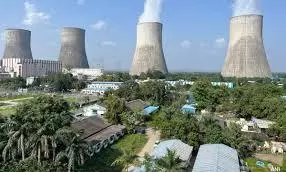
India, US to co-design and manufacture nuclear reactors under landmark agreement
text_fieldsIndia and the United States have reached a significant milestone in their civil nuclear partnership, with Washington granting approval for joint design and manufacturing of nuclear reactors in India.
This historic move marks the first time a US company will be involved in the entire process of designing, manufacturing, and transferring technology within India.
The agreement, finalised on March 26, 2025, allows US-based Holtec International to collaborate with Indian firms to build nuclear power plants under the India-US civil nuclear deal, which was originally signed in 2007 by then Prime Minister Manmohan Singh and US President George W. Bush.
Despite the agreement’s original framework being established nearly 20 years ago, progress was hindered by complex negotiations, legal hurdles, regulatory clearances, and disputes over technology transfers. Until now, US companies were only permitted to export nuclear reactors and related equipment to India, but were prohibited from engaging in design or manufacturing within the country.
India remained firm on its demand that the entire process, including design, manufacturing, and technology transfer, occur domestically. This insistence ultimately paid off, with the US agreeing to collaborate on all aspects of the nuclear power plants’ development.
Holtec International, a major US-based energy firm led by Indian-American entrepreneur Krishna P. Singh, has been authorised to transfer its small modular reactor (SMR) technology to three Indian companies - Larsen & Toubro Limited, Tata Consulting Engineers Ltd, and Holtec’s regional subsidiary, Holtec Asia.
Holtec Asia, operating since 2010 and headquartered in Pune, India, also runs a manufacturing plant in Dahej, Gujarat. Known for its expertise in nuclear technology and infrastructure decommissioning, Holtec is expected to play a pivotal role in enhancing India’s nuclear power capabilities.
The US has stipulated that the jointly designed and manufactured nuclear plants cannot be transferred to any third party or other countries without explicit consent from the US government. This safeguard aims to ensure proper oversight of the technology's use.
The US Department of Energy (DoE) approved Holtec’s application under regulation 10CFR810, part of the US Atomic Energy Act of 1954. This regulation governs the transfer of unclassified nuclear technology and assistance to foreign entities.
This agreement represents a significant win for India’s private sector, which will gain expertise in designing and manufacturing advanced nuclear reactors. India has traditionally relied on government corporations such as Nuclear Power Corporation of India Limited (NPCIL) and National Thermal Power Corporation (NTPC) for nuclear energy production.
While Holtec awaits approvals for collaboration with these state-owned firms, the new agreement is expected to open the door for greater private sector involvement in nuclear technology.
India, which has previously specialised in 220MWe PHWR (Pressurized Heavy Water Reactors), will now gain access to technology for building more advanced PWRs (Pressurised Water Reactors), the predominant technology used in nuclear power plants worldwide.
The agreement also holds strategic implications, as India and China vie for influence in the Global South’s energy landscape. Both countries are advancing in Small Modular Reactor (SMR) technology, which is considered essential for providing affordable and sustainable energy solutions.
China is actively working to dominate the global SMR market through competitive pricing, while India’s new partnership with the US positions it to strengthen its technological capabilities and offer attractive alternatives to developing nations.






















